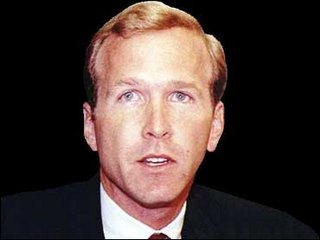
It’s not every day that you can step outside your home and watch the President of the United States drive by. It happened to me twice today. President Bush dropped by a political fundraising luncheon for
U.S. Rep. Mike Sodrel at the Murat Center in Indianapolis, which is just a block from my home in the Lockerbie Glove Company.
From my rooftop deck, I could see hundreds of demonstrators gathered along Alabama Street west of the Murat to greet the President. The President never saw them. His motorcade turned onto New Jersey after it made its way down Michigan Avenue, allowing the President to enter the Murat out of the view of the demonstrators. As it turned out, they would have done better standing along Michigan Street in the Lockerbie neighborhood if their point was to let the President see their protest signs, although police ran off at least one demonstrator who tried to position himself on Michigan Street across from my building.
The largest contingent of protestors were demonstrating against pending immigration reform legislation in Congress, which would increase border enforcement and make those who are found to be present in the U.S. without inspection guilty of a Class D felony, thereby making it impossible for undocumented aliens to ever become legal residents of the U.S. Sodrel supported this legislation when it was approved by the House last year. Bush actually opposes this approach and, instead, favors a limited guest worker visa program which would allow undocumented aliens to stay in the U.S. and work legally as long as they are gainfully employed.
When the President departed the Murat, his motorcade reversed its route to east on Michigan and then south on East Street to the onramp for I-70. Several of my neighbors stood at the end of our drive facing East Street and waved at the President as his motorcade proceeded by us. He waved through the tinted glass of his limousine, as did his Deputy Chief of Staff, Karl Rove, who accompanied him in another car. I was struck by just how few people stood along the motorcade route to see the President, given we are in the heart of downtown Indianapolis and a view was easy to come by. Few people in my neighborhood bothered to venture the few steps that they were required to take outside their door to catch a glimpse of Bush.
In between his arrival and departure, I was able to view Bush’s remarks to the Sodrel fundraiser live on WRTV-6, the only local TV station to carry the President’s speech live. He opened with the traditional “family guy” plugs. His better half, Laura, couldn’t be there, but Sodrel’s better half, Keta, was present Bush told us. Bush likes Sodrel because he’s a guy “who has his priorities straight” and “family is his top priority.” “In a land of lawyers, it’s good to have an entrepreneur” Bush said of Sodrel.
Bush recognized several other Republican dignitaries. He singled out Gov. Mitch Daniels, who he says he’s not surprised has turned out to be “a fine Governor.” Bush said, “[Daniels] doesn’t need a poll to tell him what he thinks.” He recognized other Indiana Republican members of Indiana’s congressional delegation, including Reps. Steve Buyer and Mike Pence. He mispronounced Buyer’s name as Bullyer.
Bush also recognized the presence of Indiana Attorney General Steve Carter, Secretary of State Todd Rokita and state party chairman, Murray Clark. Steve Goldsmith got a mention as well. Bush described Goldsmith as being on the “leading edge of the compassionate conservative agenda”, which Bush lost sight of after becoming president by using wedge issues, such as gay marriage, embryonic stem cell research and “right to life” to divide our country.
Bush devoted a substantial part of his speech making the case for the war in Iraq. It is the lessons of 9/11 and understanding the stakes in the global war on terrorism that we must not lose sight of according to Bush. What are the lessons of 9/11? Bush says there are three:
- We must defeat the enemy overseas so we don’t have to fight the war on terror at home.
- We must hold those who harbor terrorists accountable—they are equally as guilty as the terrorists.
- When we see a threat, we must take it seriously before it comes and hurts us.
Few people would disagree with Bush’s first lesson, but many would question just how much of a threat Iraq posed to the U.S. Bush insisted that Saddam Hussein was a threat and removing him has made Iraq and the world a safer place. In reality, the country is in the midst of a civil war in which tens of thousands of Iraqi lives have been lost, not to mention the more than 2,000 American soldiers who have died while serving in Iraq. In Hussein’s absence, we’ve seen troubling signs of the growing influence of Islamic extremism. Grand Ayatollah Ali al-Sistani, for example, recently
issued a fatwa calling for death to all gay and lesbian Iraqi’s, and it’s been carried out with indifference being shown by the occupying American troops. Bush also said that Afghanistan had been “liberated from the clutches of a barbaric regime." Yet, the Afghani’s still don’t enjoy religious freedom as evidenced by
recent news that a Christian who converted from Islam is facing prosecution punishable by death.
Bush insists that we must not lose our will to fight the war in Iraq, or we will lose. He says our objective is to “defeat totalitarian ideology” and replace it with a “philosophy of liberty.” That’s all well, but the early signs in Afghanistan and Iraq point to the establishment of totalitarian Islamic states with no room for tolerance or religious freedom. Bush cited the examples of Europe and Japan as reasons for hope in Afghanistan and Iraq, but the comparison with the events of World War II and today’s war on terrorism is not prescient. We are faced with a growing, radical Muslim influence in the world that is dedicated to the death and destruction of Judaism, Christianity, Israel, the West and its culture and, particularly, America. It is hard to argue that our efforts in either Iraq or Afghanistan have done anything but further foment their hatred of us.
Bush touched a little less on domestic issues. He continued his call for reforming big government entitlement programs, such as social security and Medicare, without acknowledging that he signed into law the largest entitlement benefit since the 1960’s—Medicare prescription drug coverage—without a plan for funding its high price tag. He patted himself on the back for having the courage as a Texan to say “we had an addiction to oil” that we must curtail. Under his administration, oil companies have earned record profits from soaring oil prices, and no long-term solution to ending our dependence on oil has been put forward by him. There’s hardly been any courage on his part—he’s the oil industry’s best friend. He also touched on the importance of helping the farmers of Indiana by making sure there is a market for their products at a fair price. If he really wants to reduce our oil independence and help Indiana farmer’s market their products, he should be doing a lot more to encourage ethanol and bio-diesel alternatives.
Political observers are debating whether today’s presidential visit will benefit the tough re-election race Sodrel faces against the incumbent he unseated in 2004, Baron Hill. Because of the president’s low approval numbers here and elsewhere, conventional wisdom suggests Sodrel should be distancing himself from Bush. One thing is for certain though--his campaign is $500,000 richer as a result of today’s fundraiser, and that cannot hurt. Our guess is that whatever happens in November, it will have nothing to do with what happened today.



